

Reinforcement and Punishment can be parenting tools for parents to control the behaviour of their teenage children. In this post, these tools will be discussed on their respective pros and cons.
The Difference between Positive/Negative Reinforcement and Positive/Negative Punishment.
February 5, 2013 7:40 pm Published by Kelley Prince M.A., BCBA In Applied Behavior Analysis, there are two types of reinforcement and punishment: positive and negative.
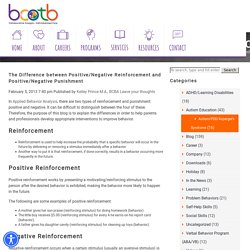
It can be difficult to distinguish between the four of these. Therefore, the purpose of this blog is to explain the differences in order to help parents and professionals develop appropriate interventions to improve behavior. Reinforcement. How to Reward Your Teen for Good Behavior.
Teenagers are young adults who are trying to learn the ways of the world.
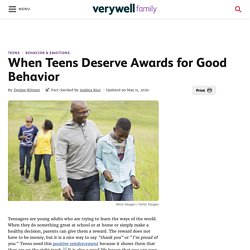
When they do something great at school or at home or simply make a healthy decision, parents can give them a reward. The reward does not have to be money, but it is a nice way to say "thank you" or "I'm proud of you. " Parenting A Teen Through Positive Reinforcement - Back On Track. Most parents can agree: the teenage years can be rough!
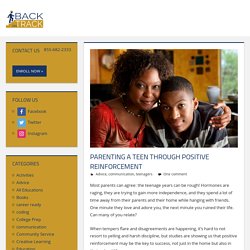
Hormones are raging, they are trying to gain more independence, and they spend a lot of time away from their parents and their home while hanging with friends. One minute they love and adore you, the next minute you ruined their life. Can many of you relate? When tempers flare and disagreements are happening, it’s hard to not resort to yelling and harsh discipline, but studies are showing us that positive reinforcement may be the key to success, not just in the home but also in their school life. Teenagers: 20 tips for good behaviour. 1.

Take time to actively listen Actively listening means paying close attention to what your child is saying and feeling, rather than thinking of what you want to say next. This shows your child that you care and that you’re interested. 2. Set clear rules about behaviour Family rules make expectations about behaviour clear. If you can, involve all family members in the discussions about rules. 7 Ways to Make Grounding Your Teen Effective Discipline. Parents often use grounding as a consequence when teenagers violate a basic family rule—like their curfew.
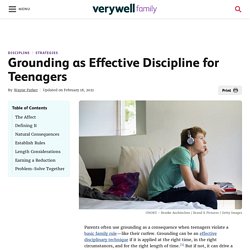
Grounding can be an effective disciplinary technique if it is applied at the right time, in the right circumstances, and for the right length of time.1 But if not, it can drive a wedge between parents and teenagers. Learn how to apply grounding as a consequence. Punishment. Discipline for Young Children: Discipline and Punishment: What is the Difference?
The State of Research on the Effects of Physical Punishment - Ministry of Social Development. Anne B.
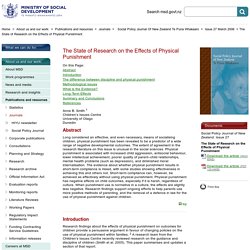
Smith 1 Children’s Issues Centre University of Otago Dunedin Abstract Long considered an effective, and even necessary, means of socialising children, physical punishment has been revealed to be a predictor of a wide range of negative developmental outcomes. The extent of agreement in the research literature on this issue is unusual in the social sciences. Discipline for Teens: Strategies and Challenges. When your child becomes a teenager, your parenting role is likely to shift.
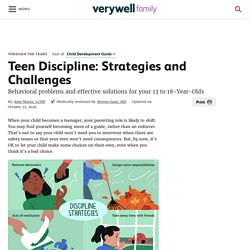
You may find yourself becoming more of a guide, rather than an enforcer. That’s not to say your child won’t need you to intervene when there are safety issues or that your teen won’t need consequences. But, by now, it’s OK to let your child make some choices on their own, even when you think it’s a bad choice. The Study of Punishment in Psychology. Punishment is a term used in operant conditioning to refer to any change that occurs after a behavior that reduces the likelihood that that behavior will occur again in the future.
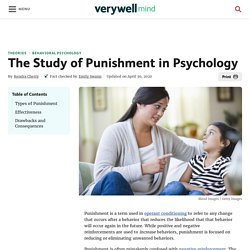
While positive and negative reinforcements are used to increase behaviors, punishment is focused on reducing or eliminating unwanted behaviors. Punishment is often mistakenly confused with negative reinforcement. The difference: Reinforcement increases the chances that a behavior will occur and punishment decreases the chances that a behavior will occur. Types of Punishment Behaviorist B.